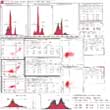|
37TH ANNUAL MEETING OF THE EASD. Glasgow, UK (September 9-13, 2001)
INTERLEUKIN-1b DECREASES THE RESISTANCE OF RAT BETA-CELLS TO DIFFERENT AGENTS
V. Goranov, T. Mokhort, S. Melnov
The cytokine, interleukin-1b (IL-1b) has been implicated to play an important role in the beta-cell damage of type 1 diabetes. Recent work has highlighted the importance of Fas expression is increased on beta-cells, in response to IL-1b treatment. Here, we report that IL-1 alone induces apoptosis in rat islets and we confirm, that IL-1 further sensitises rat beta-cell to the induction of apoptosis by a Fas-dependent mechanism in case of subsequent influence of streptozotocin or IL-1, but not alloxan.
Isolated rat pancreatic islets were precultured for 6 d and than exposed to IL-1b (10 U/ml) for 18 h or remained untreated (control). Every other day (by 6th d) after cytokine treatment, cell viability was measured in colorimetry tests with neutral red. CD95 antigen was measured by FACS analysis on prepared with EDTA single islet cells. On the fourth day after the moment of cytokine treatment both experimental groups of pancreatic islet cells were again treated by IL-1b (10 U/ml) for 18 h, as well as by streptozotocin (0.1 mM) or alloxan (1.0 mM) for 0.5 h. Part of the cells in these experimental groups was left without repeated influence. The CD95 antigen expression was observed in 17 ± 2.1% for interleukin treating cells, but in four days its content was 5 ± 0.1%. The repeated addition of IL-1b or its combination with streptozotocin caused a reduction of beta-cell number (p < 0.05) (23 ± 4.1% vs intact cells' culture and 40 ± 6.3% vs once treated with interleukine cells culture). CD95 antigen expression increased to 56 ± 8% in these beta-cells. Similar changes were observed when streptozotocin was used on the fourth day after initial influence of IL-1b. But only 20 ± 2% cells expressed CD95 antigen in this case. The same regime incubation with alloxan didn't demonstrate reliable difference of CD95 antigen expression vs control. But in this case observed reduction of beta-cells number 26 ± 5.6% vs once treated with interleukine cells culture. It is possible to conclude that interleukin-1b is not only cytotoxic for beta-cells, but make them more sensitive to cytotoxic agents such as streptozotocin, alloxan and also interleukin-1b itself. This cytokine-induced decrease of of beta-cell stability is associated with changes in CD95 antigen expression. But in case of alloxan It was realized by quite different mechanisms of beta-cells destruction.
|



